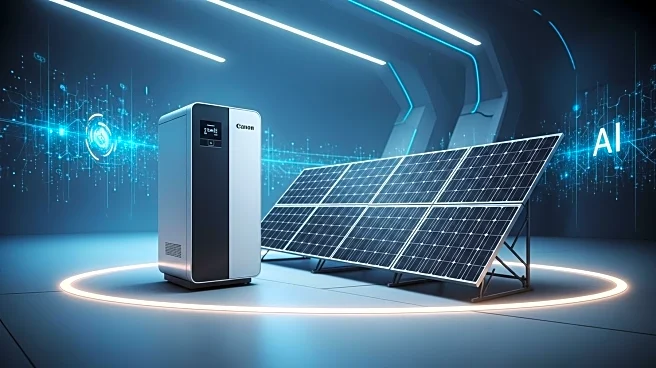What is the story about?
What's Happening?
Rewiring America, a pro-electrification nonprofit, has released a report suggesting that investments in residential heat pumps, batteries, and solar arrays could meet the projected electricity demand growth from AI data centers through 2029. The report highlights that large tech and infrastructure companies could unlock over 93 GW of grid capacity by subsidizing 50% of heat pump upgrades and 30% of onsite solar and storage costs. This approach is presented as a cost-effective alternative to building new gas power plants. The report emphasizes the potential for households to play a significant role in meeting power needs, with targeted investments in energy-efficient appliances and distributed energy resources. The report also notes the rising electricity prices and the expiration of federal tax credits for energy-efficient appliances, which could further increase utility rates.
Why It's Important?
The proposal by Rewiring America is significant as it offers a sustainable solution to the growing energy demands of AI data centers, which are expected to increase substantially. By focusing on residential energy investments, the plan could alleviate the burden of rising electricity prices on consumers and reduce reliance on fossil fuel and nuclear power plants. This approach could also help utilities and hyperscalers avoid long lead times and high construction costs associated with new gas turbines. The initiative could lead to a more resilient and efficient power system, potentially freeing up over 100 GW of grid capacity over five years. The report's emphasis on household involvement in energy solutions highlights a shift towards decentralized energy systems, which could have long-term benefits for grid stability and consumer costs.
What's Next?
If adopted, the strategy proposed by Rewiring America could lead to significant changes in how energy demands are met in the U.S. The focus on residential energy investments may prompt utilities and tech companies to explore new partnerships and funding models to support these initiatives. The potential for distributed capacity procurement and virtual power plants could become more prominent, offering alternative solutions to traditional power generation methods. As federal energy tax credits expire, stakeholders may need to consider new incentives to encourage widespread adoption of energy-efficient technologies. The report suggests that in competitive wholesale markets, data centers could directly contract with DER aggregators, bypassing traditional utilities.
Beyond the Headlines
The proposal by Rewiring America could have broader implications for the U.S. energy landscape, promoting a shift towards more sustainable and decentralized energy systems. The focus on household energy solutions could empower consumers to take a more active role in energy management, potentially leading to increased awareness and adoption of renewable energy technologies. The initiative also highlights the importance of addressing the environmental impact of growing data center demands, offering a pathway to reduce carbon emissions and enhance grid resilience. The report's emphasis on cost-effective solutions could drive innovation in energy-efficient technologies and encourage investment in clean energy infrastructure.















